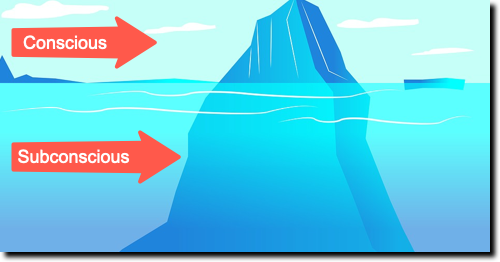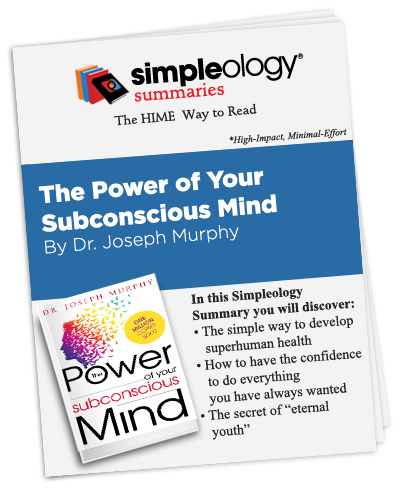Is the Subconscious Mind a Bunch of Hogwash?
A scientist who views the world through a purely rational “mechanistic” lens would say …
“Show me this supposed ‘subconscious’ mind. Point to me where in the brain it exists.”
One can’t, of course. So, therefore, it doesn’t exist?
Well, psychologists still use the term to this day.
(Some disambiguate between the “unconscious” and the “subconscious” but, like all things in science, such distinctions and terms are constantly changing. I wouldn’t get too wrapped up in the terminology du jour. More about that in a moment.)
The basic idea is that the conscious mind – what you are aware of or deliberately thinking in the moment – is the tip of an enormous (maybe even infinite?) iceberg.

Further, the subconscious/unconscious is believed by many Psychologists to be the real director of the show of your life.
Who is right?
Does the subconscious even exist? If we can’t point to it in the brain, what are we actually talking about?
Well, first off, some now believe that consciousness itself doesn’t reside in the brain at all. And it’s not just the proponents of woo-woo metaphysics who posit this notion.
Even well-lettered formal academics like Dr. Peter Fenwick (a well-published neuropsychologist and neurophysiologist with a degree from Trinity at Cambridge who is also generally well-respected in the formal academic community) believes that the brain is not the generator of consciousness, but a filter of consciousness. He came to this seemingly odd conclusion after conducting decades of research in near-death experiences.
When we combine that with new notions like the existence of a “second brain” in the gut …
And that the magnetic field that surrounds the heart is even stronger than the magnetic field surrounding the brain …
Perhaps the notion of the subconscious is not so unsupportable as the mechanists would claim after all.
There are, in fact, many clues pointing to its existence …
We do know that memories are stored somewhere.
We know that we have these patterns called “habits”. We know that they are related to certain pathways in the nervous system (and that certain pathways become more “myelinated” the more we use them) …
But can we say for certain these memories and patterns are actually stored in the nervous system?
Whatever the subconscious actually “is”, it’s at the very least a handy shorthand for many easily observable phenomena. And when we posit its existence we can, in fact, do many quite useful things with this idea.
More about that in a moment …
First, let me put your mind at ease about the primary question at hand …
Does the subconscious actually exist?
While we have many clues … anyone who says we have it all figured out?
They’re yanking your chain.
The more I learn about science, the less I respect scientists who make grand sweeping statements like …
“______ is settled science”
(science doesn’t ever seem to “settle” – any look at history easily demonstrates this)
“_____ doesn’t exist”
(how can you prove the non-existence of something?)
… and the more I respect intellectually honest scientists like Richard Feynman. He once said …
“Science is the belief in the ignorance of experts. When someone says ‘science teaches such and such’, he is using the word incorrectly. Science doesn’t teach it; experience teaches it”
…. and philosophers like Thomas Kuhn who say that scientific evolution is not necessarily always “linear progress” but more a matter of shifting “paradigms”. And that those shifting paradigms don’t always represent improvements, but are as fickle and random as fashion.
Enter the Self-Help Gurus
Formal academic scientists often belittle self-help literature. Hell, many ridicule anything that doesn’t bear the stamp of formal academic peer-reviewed research.
Are they right to do so?
Yes and no.
As Isaac Asimov stated in his famous essay about “endoheretics vs. exoheretics”, scientists are right to push back hard against anything that does not conform to the prevailing scientific views of the day. His belief was that this served as a type of “immune system” against would-be corruptors of the hard-fought scientific “truths.”
While I understand and respect this stance, I think it fails to take many things into consideration. Most importantly …
- not all formal research is legitimate
(indeed, scientific fraud is committed daily by those with various agendas)
- as Kuhn observed, the prevailing body of scientific knowledge evolves
(and not always for the better)
- many notions once dismissed as “hogwash” are later corroborated in the lab
(does this have you curious? it should …)
“Hogwash! Show me one. Just one! I’m waiting …”
Well, there are many …
Much of what the Indian yogis taught, for example, is now corroborated by formal academia.
Here’s another …
For the longest time it was believed that the functions of the autonomic nervous system could not be controlled consciously. But now people like Wim Hof have been shown in the lab to do just that. Indeed, many biology textbooks were updated because of his work.
Once could cite many such cases. If one looks with an open mind …
Now, to be clear, I’m not advocating opening oneself up to any random charlatan with a random hypothesis. (This is one way Asimov’s lens can be quite helpful.) But I am saying that just because something does not bear the stamp of formal academia, it should not be summarily dismissed.
What now?
If the prevailing scientific body of knowledge is constantly evolving …
If this evolution is not always for the better …
And if therefore, there is no 100% reliable “record of truth” against which we can bounce any information to check its validity …
Then, what do we do when presented with any information at all?
Useful Lenses
To me, it’s not so important to find what is true (a Quixotic task, perhaps) but to find what is useful …
This is why my core philosophy, as stated in the Simpleology print book, is what I call “Utilitarian Model Flexibility”.
Simply put, I don’t care whether or not a hypothesis is “true”. I only care about how useful it is.
And usefulness is dependent on context!
(For example, many believe that “Einstein disproved Newton.” But when I was serving as an artillery officer, and my platoon was sending 155mm projectiles 24km downrange, and hitting the targets dead on … Did we care that Einstein “disproved” Newton’s Laws? Nope. The foundation of our work was all Newton, all day long. Artillery officers don’t care that Newton’s Laws fall apart at the subatomic level.)
A simple way to put this is … find a “useful lens” for any given situation. Test it as a real scientist would. If it gets you the result you want, that’s all the “proof” you need.
To me, that is the real litmus test for any hypothesis. I couldn’t give a rat’s backside about “consensus”. I don’t care how many “experts agree”. If I use it myself, will it get me the result I want?
Just remember that as you go through your life what is useful will change. That is, as the context of your life changes, what is useful to you will as well.
One of Self-Help’s Most Useful Lenses
So, I fully embrace the body of self-help literature out there. I’m even open to a great many “woo-woo” ideas.
Yes, amongst it all is some unmitigated bullshit. (Perhaps the majority of it, in fact. Much of it is written by the wrong people for the wrong motivations.)
But self-help literature is also the home of many extremely “useful lenses” …
The Power of Your Subconscious Mind is amongst the most supremely useful reads in the genre.
Dr. Joseph Murphy started out as a Catholic …
Went on to become a minister in two different “New Thought” churches …
And then went on to get a Ph.D. in Psychology at the University of Southern California.
It was only after he was able to back up, and refine, the strange ideas he learned in the New Thought movement with a backbone in formal academia that he wrote this indispensable read.
Yes, some of the claims are hyperbolic …
- the simple way to develop superhuman health
- how to have the confidence to do everything you have always wanted
- the secret of “eternal youth”
… but he’s not too far off the mark. Maybe you won’t become “superhuman” or attain “eternal youth”, but I have personally used these ideas to great effect and consider them to be some of the most “useful” tools in my toolbox of “useful lenses.”
And now you can get the gist of the book for FREE – in about 5 minutes …
Simpleology Summaries:
The Power of Your Subconscious Mind by Joseph Murphy
download now (while it’s free)




